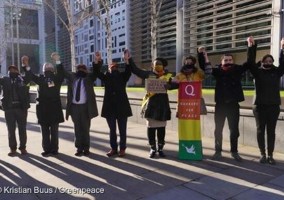Charities have warned that new anti-protest laws could further restrict their ability to campaign.
In the Queen’s speech on Tuesday, Prince Charles unveiled a Public Order Bill to crack down on protesters who are deemed “dangerous” and use “highly disruptive tactics”.
The bill would grant new powers to the police to “prevent a minority of protestors from using guerrilla tactics that cause misery to the hardworking public, disrupting businesses, costing millions in taxpayers’ money and putting lives at risk”. The measures appear to target groups such as Insulate Britain and Extinction Rebellion, whose recent protests were cited in the government’s briefing notes.
In addition, the bill would extend stop and search powers to “make the streets safer”, meaning that the police would be able to seize articles related to the new offences.
The government originally attempted to bring in these measures in the Police, Crime, Sentencing and Courts Act, which received Royal Assent last month. However, the House of Lords blocked the changes following successful lobbying by civil society groups.
The Public Order Bill passed its first reading on Wednesday, the first step in the process of making it law. It will have a second reading on 23 May.
‘Significant and draconian restrictions on the right to protest’
Suhan Rajkumar, a campaigning law specialist at Bates Wells, said that the bill could affect charities’ campaigning activities.
He said: “The introduction of serious disruption prevention orders and new criminal offences via the Public Order Bill will place significant and draconian restrictions on the right to protest.
“Charities and civil society organisations have, throughout their history, led and supported campaigns for social and legal change, in which peaceful protest has always been key. These new restrictions will further shrink the space within which individual campaigners can lawfully act, and risk having a chilling effect on charities and civil society organisations looking to play a part in public dissent and social change.”
Protests are ‘critical’ components of democracies
Rosemary Forest, civic space policy adviser at Bond, said: “It’s vital that charities and other civil society organisations have space to operate and campaign freely. If our members cannot campaign, then we as a sector and as organisations cannot deliver our wider development and humanitarian goals. Whether big or small, protest is a critical component of any democracy and a core element of campaigning.”
She added: “The measures included in this bill further undermine the right to protest. This bill is one among many that is creating a challenging environment for civil society campaigners – including charities. It appears to be part of a wider effort to reduce our ability to hold the government accountable and speak truth to power.”
Echoing Forest’s comments, Chris Walker, policy and public affairs manager at NCVO, said: “The Police Act already severely restricts our right to protest. These additional draconian measures, which the House of Lords rightly rejected a matter of weeks ago, will go even further in limiting dissent.
“The freedom to protest peacefully is a fundamental right, and placing further limits on this right is bad for charities’ abilities to speak out, and for the broader health of civil society.”
Related articles











